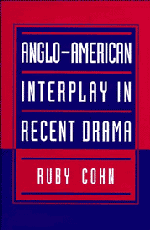3 - Phrasal energies
Published online by Cambridge University Press: 19 March 2010
Summary
Alan Ayckbourn and Neil Simon ground their several stage languages upon the firm foundation of shaky families. Edward Bond and Sam Shepard thread the figure of the artist through their far more varied plays. Harold Pinter and David Mamet share neither figure nor common ground, but they both pitch telling phrases with deadly accuracy. More than other contemporary Anglophone playwrights, they are verbal marksmen. Today the dramatic languages of Pinter and Mamet are enveloped in superlatives, but not too long ago their detractors denounced the English playwright for obfuscation and the American for obscenity. Recent plays of Pinter were also dismissed as political, and after Oleanna (1992) Mamet has been charged with misogyny, but I prefer to compare their taut, striking phrases.
Both Pinter and Mamet came to playwriting via acting, the Englishman in provincial repertory and the American under the aegis of Method practitioners. As playwrights, both men have battened on criminal films, and both have written screenplays that are not limited to crime. At the same time, both Pinter and Mamet derive obliquely from Beckett in their tacit acceptance of the proscenium, their sparsely peopled stages, the seriousness of their comedy, the resonance of their dialogue, and their common predilection for repetition. Pinter and Mamet stray from Beckett, however, in the localized time and place of their dramatic action, the one in England and the other in the United States.
“All we have left is the English language,” chirps Spooner in Pinter's No Man's Land, and although Mamet characters do not credit the American language as their lifesaver, it is.
- Type
- Chapter
- Information
- Anglo-American Interplay in Recent Drama , pp. 58 - 93Publisher: Cambridge University PressPrint publication year: 1995



